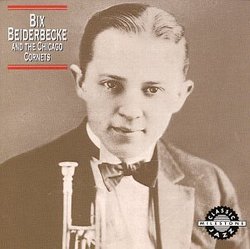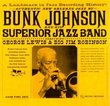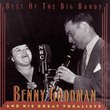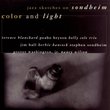| All Artists: Bix Beiderbecke & Chicago Cornets Title: Bix Beiderbecke & Chicago Cornets Members Wishing: 1 Total Copies: 0 Label: Milestone Release Date: 7/1/1991 Genres: Jazz, Pop Style: Traditional Jazz & Ragtime Number of Discs: 1 SwapaCD Credits: 1 UPCs: 025218471923, 0090204088980, 090204088980 |
Search - Bix Beiderbecke & Chicago Cornets :: Bix Beiderbecke & Chicago Cornets
 | Bix Beiderbecke & Chicago Cornets Bix Beiderbecke & Chicago Cornets Genres: Jazz, Pop
|
Larger Image |
CD DetailsSimilar CDs
Similarly Requested CDs
|
CD ReviewsYet another vital recording from Richmond, Indiana (?!!) Marc Dolan | Brooklyn, NY USA | 01/08/2001 (4 out of 5 stars) "In the mid-1920s, the Gennett studios in Richmond, Indiana, was the center of much of what was groundbreaking in recorded jazz. This is Bix as he sounded at the beginning--the closest rock analogy would be pre-Bowie Iggy Pop, when he was still with the Stooges. In addition to the earliest Gennett sides, it also includes some of the first sides he cut in New York. If you want Bix at his most essential, get the first volume of the Columbia set; if you want him at his most entertaining, get the second volume of the Columbia set. But this is where he began, and it's fun to listen to how the jazz fan became the jazz artist." Bix shines through Marc Dolan | 08/08/2003 (5 out of 5 stars) "Bix in his earliest recordings is superb! Although lacking the melodic refinement of his later work, his tonal quality and driving force is obvious in these recordings. His piano solo on "Big Boy" just goes to show his versatility as a musician. The rest of the Wolverines aren't half bad either, despite their reputation with modern critics. Bix once said that his Wolverines recordings were shallow and one-dimensional, but for their time they were the cutting edge. The influence of Paul Mares is impossible to miss when you hear Bix on these tunes -- follow this CD with some New Orleans Rhythm Kings and compare!The last five tracks feature Muggsy Spanier and his Bucktown Five, and two are from the Wolverines after Bix left. Still good music, but after hearing the first half of the CD, you feel that something's just missing without Bix...." Very Poorly Done J. Douglas Benson | Maryland | 08/21/2009 (1 out of 5 stars) "This is supposedly the "benchmark" reissue of the Bix/Wolverines material, and I just gave it a listen all the way through. I was horrified when in several of the songs there were jumps and glitches due to poor editing. The worst example is in "Royal Garden Blues" when at about :24 seconds in, the song jumps ahead by 2 bars! What this tells me is that the "original source material" was likely an old LP reissue (probably the Milestone 1974 version) and the 33 1/3 record was transferred with a skip in it, which the remastering engineer tried to hide. Both takes of Lazy Daddy have similar glitches and dropped beats, as does "Big Boy"-- right in the middle of Bix's piano solo! What an awful, awful reissue! And for those of you who will try to say it was my CD player skipping, I can say absolutely not. This is indeed a half-baked production. The sound is very inconsistent and in most cases filtered excessively. I can forgive the filtering, after all, that's how things were done in the '90s. But when there are actually chunks of the music missing, it's a bit much for me. I'd definitely not recommend this one."
|

 Track Listings (28) - Disc #1
Track Listings (28) - Disc #1












